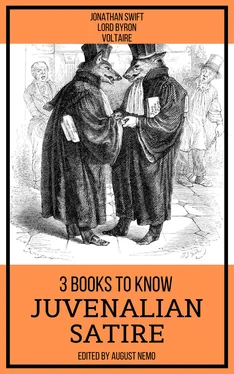Lull'd like the depth of ocean when at rest,
Fair as the crowning rose of the whole wreath,
Soft as the callow cygnet in its nest;
In short, he was a very pretty fellow,
Although his woes had turn'd him rather yellow.
He woke and gazed, and would have slept again,
But the fair face which met his eyes forbade
Those eyes to close, though weariness and pain
Had further sleep a further pleasure made;
For woman's face was never form'd in vain
For Juan, so that even when he pray'd
He turn'd from grisly saints, and martyrs hairy,
To the sweet portraits of the Virgin Mary.
And thus upon his elbow he arose,
And look'd upon the lady, in whose cheek
The pale contended with the purple rose,
As with an effort she began to speak;
Her eyes were eloquent, her words would pose,
Although she told him, in good modern Greek,
With an Ionian accent, low and sweet,
That he was faint, and must not talk, but eat.
Now Juan could not understand a word,
Being no Grecian; but he had an ear,
And her voice was the warble of a bird,
So soft, so sweet, so delicately clear,
That finer, simpler music ne'er was heard;
The sort of sound we echo with a tear,
Without knowing why—an overpowering tone,
Whence Melody descends as from a throne.
And Juan gazed as one who is awoke
By a distant organ, doubting if he be
Not yet a dreamer, till the spell is broke
By the watchman, or some such reality,
Or by one's early valet's cursed knock;
At least it is a heavy sound to me,
Who like a morning slumber—for the night
Shows stars and women in a better light.
And Juan, too, was help'd out from his dream,
Or sleep, or whatso'er it was, by feeling
A most prodigious appetite: the steam
Of Zoe's cookery no doubt was stealing
Upon his senses, and the kindling beam
Of the new fire, which Zoe kept up, kneeling
To stir her viands, made him quite awake
And long for food, but chiefly a beef-steak.
But beef is rare within these oxless isles;
Goat's flesh there is, no doubt, and kid, and mutton;
And, when a holiday upon them smiles,
A joint upon their barbarous spits they put on:
But this occurs but seldom, between whiles,
For some of these are rocks with scarce a hut on;
Others are fair and fertile, among which
This, though not large, was one of the most rich.
I say that beef is rare, and can't help thinking
That the old fable of the Minotaur—
From which our modern morals rightly shrinking
Condemn the royal lady's taste who wore
A cow's shape for a mask—was only (sinking
The allegory) a mere type, no more,
That Pasiphae promoted breeding cattle,
To make the Cretans bloodier in battle.
For we all know that English people are
Fed upon beef—I won't say much of beer,
Because 't is liquor only, and being far
From this my subject, has no business here;
We know, too, they very fond of war,
A pleasure—like all pleasures—rather dear;
So were the Cretans—from which I infer
That beef and battles both were owing to her.
But to resume. The languid Juan raised
His head upon his elbow, and he saw
A sight on which he had not lately gazed,
As all his latter meals had been quite raw,
Three or four things, for which the Lord he praised,
And, feeling still the famish'd vulture gnaw,
He fell upon whate'er was offer'd, like
A priest, a shark, an alderman, or pike.
He ate, and he was well supplied: and she,
Who watch'd him like a mother, would have fed
Him past all bounds, because she smiled to see
Such appetite in one she had deem'd dead;
But Zoe, being older than Haidee,
Knew (by tradition, for she ne'er had read)
That famish'd people must be slowly nurst,
And fed by spoonfuls, else they always burst.
And so she took the liberty to state,
Rather by deeds than words, because the case
Was urgent, that the gentleman, whose fate
Had made her mistress quit her bed to trace
The sea-shore at this hour, must leave his plate,
Unless he wish'd to die upon the place—
She snatch'd it, and refused another morsel,
Saying, he had gorged enough to make a horse ill.
Next they—he being naked, save a tatter'd
Pair of scarce decent trowsers—went to work,
And in the fire his recent rags they scatter'd,
And dress'd him, for the present, like a Turk,
Or Greek—that is, although it not much matter'd,
Omitting turban, slippers, pistols, dirk,—
They furnish'd him, entire, except some stitches,
With a clean shirt, and very spacious breeches.
And then fair Haidee tried her tongue at speaking,
But not a word could Juan comprehend,
Although he listen'd so that the young Greek in
Her earnestness would ne'er have made an end;
And, as he interrupted not, went eking
Her speech out to her protege and friend,
Till pausing at the last her breath to take,
She saw he did not understand Romaic.
And then she had recourse to nods, and signs,
And smiles, and sparkles of the speaking eye,
And read (the only book she could) the lines
Of his fair face, and found, by sympathy,
The answer eloquent, where soul shines
And darts in one quick glance a long reply;
And thus in every look she saw exprest
A world of words, and things at which she guess'd.
And now, by dint of fingers and of eyes,
And words repeated after her, he took
A lesson in her tongue; but by surmise,
No doubt, less of her language than her look:
As he who studies fervently the skies
Turns oftener to the stars than to his book,
Thus Juan learn'd his alpha beta better
From Haidee's glance than any graven letter.
'T is pleasing to be school'd in a strange tongue
By female lips and eyes—that is, I mean,
When both the teacher and the taught are young,
As was the case, at least, where I have been;
They smile so when one 's right, and when one 's wrong
They smile still more, and then there intervene
Pressure of hands, perhaps even a chaste kiss;—
I learn'd the little that I know by this:
That is, some words of Spanish, Turk, and Greek,
Italian not at all, having no teachers;
Much English I cannot pretend to speak,
Learning that language chiefly from its preachers,
Barrow, South, Tillotson, whom every week
I study, also Blair, the highest reachers
Of eloquence in piety and prose—
I hate your poets, so read none of those.
As for the ladies, I have nought to say,
A wanderer from the British world of fashion,
Where I, like other 'dogs, have had my day,'
Like other men, too, may have had my passion—
But that, like other things, has pass'd away,
And all her fools whom I could lay the lash on:
Foes, friends, men, women, now are nought to me
But dreams of what has been, no more to be.
Return we to Don Juan. He begun
To hear new words, and to repeat them; but
Some feelings, universal as the sun,
Were such as could not in his breast be shut
More than within the bosom of a nun:
He was in love,—as you would be, no doubt,
With a young benefactress,—so was she,
Just in the way we very often see.
And every day by daybreak—rather early
For Juan, who was somewhat fond of rest—
She came into the cave, but it was merely
To see her bird reposing in his nest;
And she would softly stir his locks so curly,
Without disturbing her yet slumbering guest,
Читать дальше












